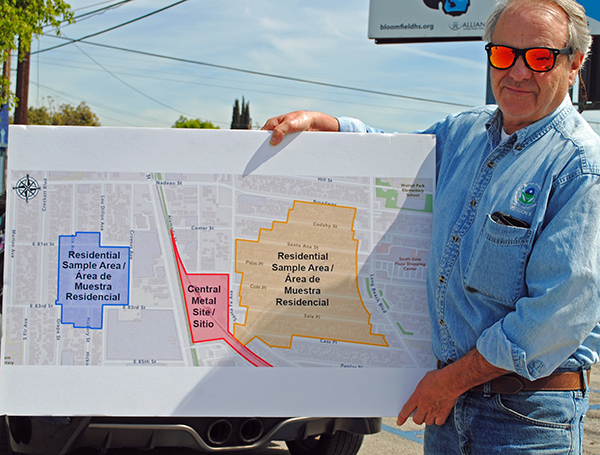Supervisors support Superfund list for Exide plant

Wave Staff Report
LOS ANGELES — The county Board of Supervisors unanimously supported a proposal by the U.S. Environmental Protection Agency to add the former Exide battery recycling plant in Vernon and surrounding communities into the national priorities list as a Superfund site next spring.
The former battery recycling plant contaminated soil in homes across Southeast Los Angeles, East Los Angeles and Boyle Heights over a period of decades and many residents continue to deal with lead contamination and inadequate cleanup.
On a motion by Supervisor Hilda Solis and Janice Hahn, the supervisors directed county staff to send a letter to the EPA in support of naming the area around Exide a federal Superfund site to assist with the clean up of the contaminated property.
The EPA announced the proposed addition of the Exide Technologies site to the Superfund National Priorities List earlier this month. The list keeps track of known sites where historic releases of hazardous substances, pollutants or contaminants pose significant threats to human health and the environment.
In a statement, Solis said Exide has emitted lead, arsenic, cadmium and other toxins for decades into its property in Vernon and surrounding communities that include Bell, Commerce, Huntington Park and Maywood. During that time, contaminated groundwater and released battery acid from Exide seeped into roads and other public areas, exposing generations of residents to the contamination.
“I am deeply encouraged by the U.S. EPA’s proposal to add Exide to the Superfund National Priorities List,” Solis said. “This pivotal step marks a significant milestone in addressing the environmental injustices that have long plagued our communities in East and Southeast Los Angeles.
“For years, the residents of this area have borne the brunt of Exide’s hazardous practices, which have left a legacy of lead contamination and other toxic pollutants.”
Hahn issued her own statement, saying “the families impacted by the Exide disaster have faced one indignity after another. Home should be our safest place, but instead their homes were marred by toxic contamination. And to add insult to injury, there are serious concerns about the pace, efficacy and scale of the state’s cleanup efforts.
“Securing the Superfund designation will mean that the federal government grasps what we’ve already known: that this problem is urgent and that these communities deserve better. It is not just about cleaning up contamination; it’s about restoring dignity for these communities.”
Solis said that by being added to the Superfund National Priorities List, the Exide site will receive the rigorous cleanup and long-term oversight it so desperately needs. It will also help restore confidence in the government’s commitment to environmental justice and public health.
“The community’s tireless advocacy and resilience have brought us to this moment,” Solis said. “Their voices and stories have underscored the urgent need for federal intervention. As we move forward, I remain committed to working alongside federal, state and local partners to support the cleanup efforts and to advocate for the well-being of our communities.
“Together, we will turn the page on this chapter of environmental injustice and work towards a future where every community can thrive in a safe and healthy environment.”
A 60-day public comment period is now underway to receive input on EPA’s proposal. Public comments must be postmarked or submitted online by Nov. 4, 2024.
The Exide plant ceased operations in 2013. A 2020 decision by a federal bankruptcy court judge allowed the company to rid itself of the financial cleanup involving the Vernon site and other operations in the country.
The state Department of Toxic Substances Control has been overseeing cleanup efforts. The federal EPA began considering the Exide property for Superfund status in July 2022.
The Superfund National Priorities List includes sites with the nation’s most serious uncontrolled or abandoned releases of contamination. The list serves as the basis for prioritizing EPA Superfund cleanup funding and enforcement actions.
Before the EPA adds a site to the National Priorities List, a site must meet EPA’s requirements and be proposed for addition to the list in the Federal Register, subject to a 60-day public comment period. EPA may add the site to the National Priorities List if it continues to meet the listing requirements after the public comment period closes and the agency has responded to any comments.





